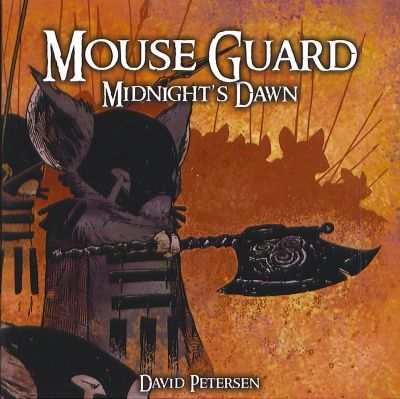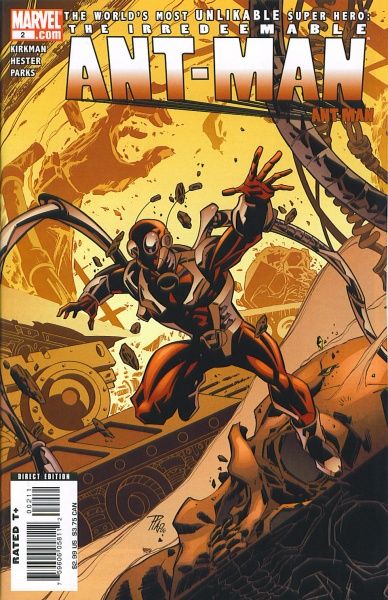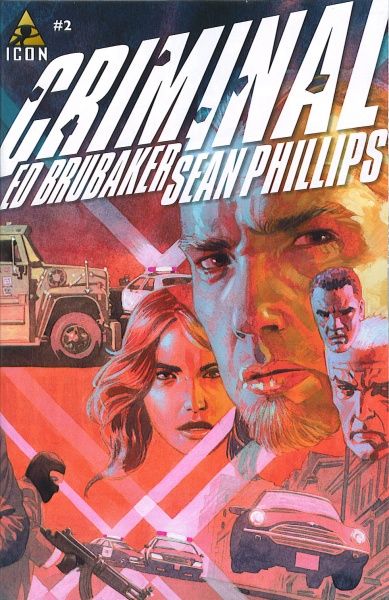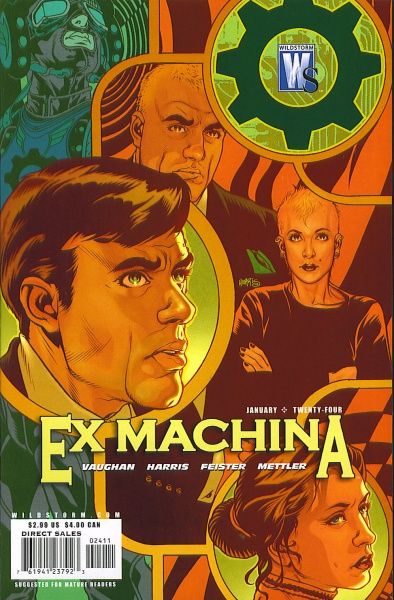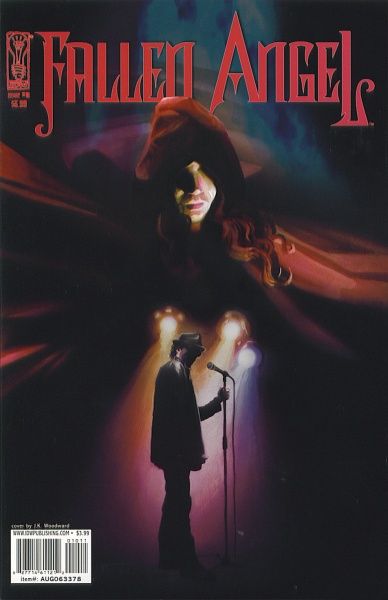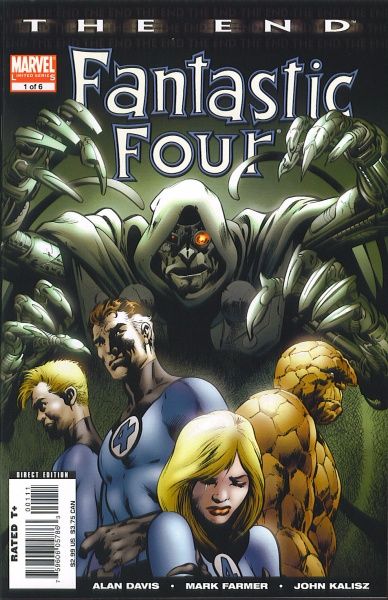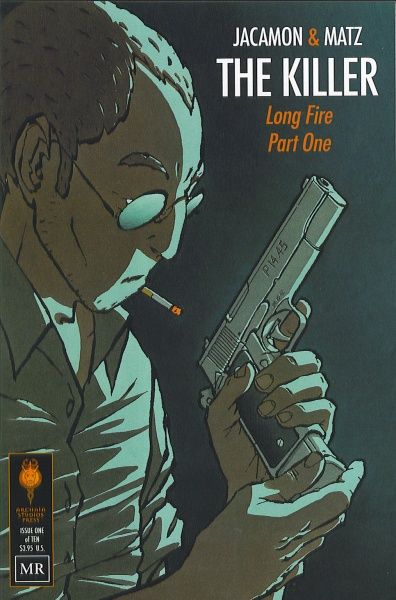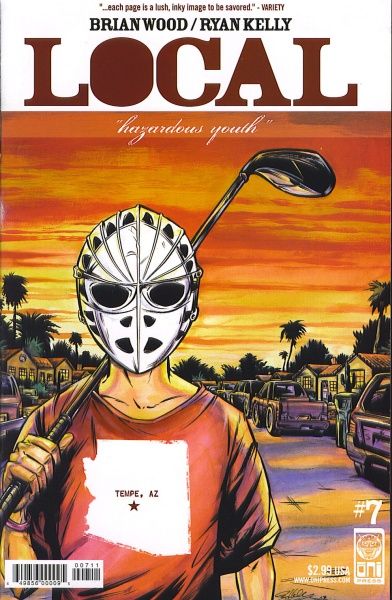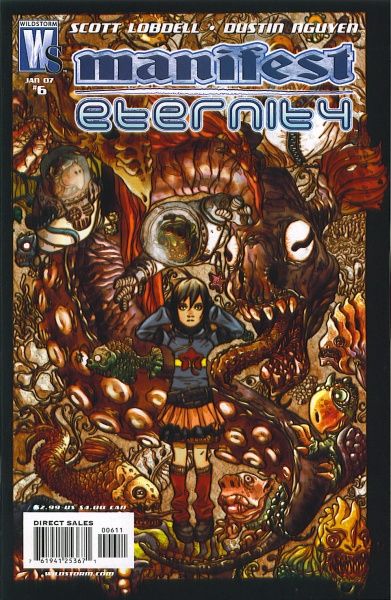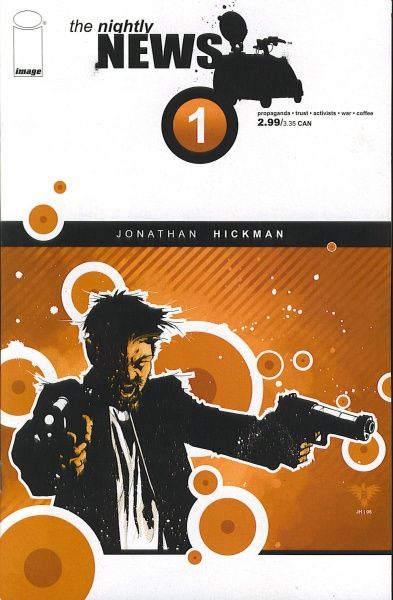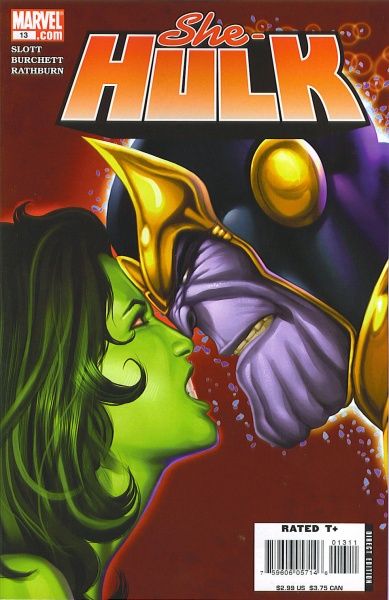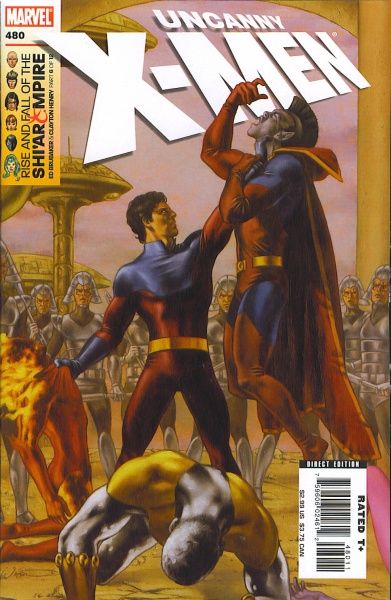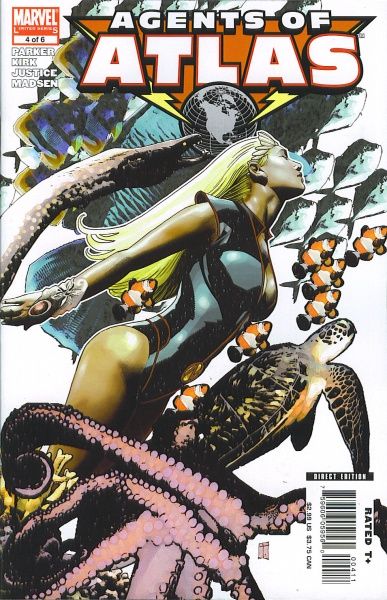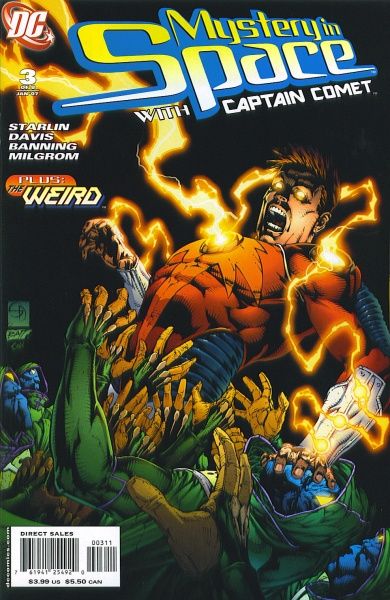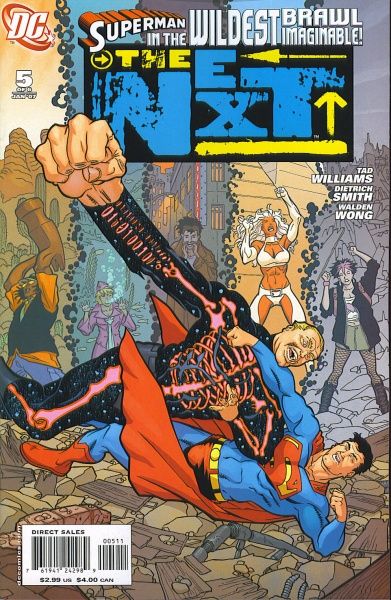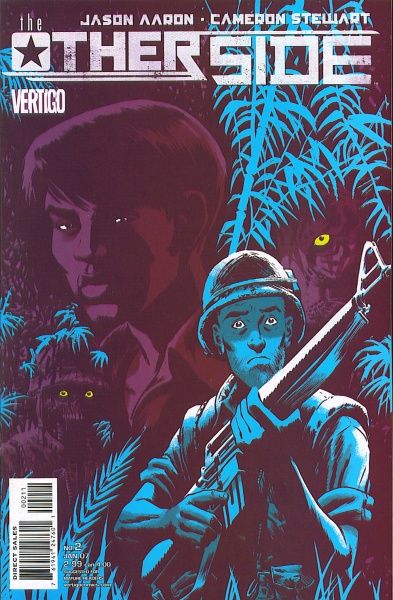Another month, another crapload of books. It's good, though, because some were very fun, and some I skipped this time, and some I read and have decided not to purchase again ... including one that might surprise you! Oh, the suspense!!!!
The Irredeemable Ant-Man #2 by Robert Kirkman, Phil Hester, and Ande Parks. $2.99, Marvel.
After a pretty good first issue, the second was kind of strange. On the one hand, there's no reason why you can't have graphic violence and humor in the same comic (ask Tarantino how it's worked out for his movies), but on the other hand, someone gets shot in the head, and it's a bit jarring. It's not that I'm all squeamish about people getting shot in the head in my comics, it's just that it seemed to close off a LOT of potential stories for this book, and leave only a few that aren't as interesting. I'm going to stick with it for a few issues to see where Kirkman is going, but my curiosity has dropped a bit, which is a shame, because who doesn't love jerky superheroes?
The story continues to flip between six months ago and the present, and we learn why Chris, who originally wore the Ant-Man suit, is no longer wearing it and Eric is, but other than finding out that Eric is even more of a jerk than we thought after last issue, we don't learn much more. There is also an attack by a whole bunch of supervillains on the SHIELD helicarrier that is problematic. I suppose by sheer numbers they manage to overwhelm the helicarrier's defenses, but these no-namers brought down the SHIELD helicarrier? Really? I don't know any of the villains (Kirkman and Hester could have invented them, I guess, but it's more likely they're just obscure - sound off if you know any!), and I find it hard to believe they could cripple the helicarrier. You mean no big-time villain has ever attacked it? It looks awfully easy to take it down.
So there's some mystery about what's going on. Who was behind the attack on the helicarrier? What's Eric's role in it, and the horrible fate of Mitch, who is unhappy at the end of the book? What has Eric been doing for six months? I just wonder if Kirkman has shot himself in the foot (as opposed to the head) with his narrative choices. We'll see. I'll stick around for a few more issues, because it's not a bad comic, and it's intriguing enough to keep me around for now.
Criminal #2 by Ed Brubaker and Sean Phillips. $2.99, Marvel.
It's a mark of a good writer that he subverts your expectations, and Brubaker does that with the second issue of Criminal. It's not that anything in this book really surprised me from a plot standpoint - I expected the job to go horribly, horribly wrong and for people to die, because there's no drama if it didn't - it's just that I didn't expect it to happen in the second issue. Brubaker barrels along at a breakneck pace, and now, I imagine, the interesting part of the book begins, as this is a five-issue story and the heist is already over! Where will he go with it? That's the intriguing question.
That's the interesting thing about Brubaker's writing, and why his work on Uncanny X-Men (see below), while decent, is not as strong (I suppose it really can't be, because of the corporate nature of the Mighty Mutants). He is good at creating these universes where people are trying to be somewhat decent, but for whatever reason, they find it difficult. Leo is this kind of person - he steals, sure, but he's not a horrible person, and when things go wrong, he's genuinely upset and tries to help as many people as he can. It's easy, from our law-abiding perch, to condemn Leo for his stupid lifestyle choices, and I certainly don't have any sympathy for him (get a job, Leo, for crying out loud!), but this is fiction, and in fiction characters like Leo, next to whom you wouldn't want to stand on the subway, become compelling. Brubaker packs the issue with nice details, and it's a far more satisfying read than most of what's out there.
I also don't mean to harp on advertising so much (and, you'll notice, it's been a while since I've done so), but did anyone notice how much more annoyed they were reading a mainstream book this week as opposed to something like this, with no ads? If companies want to pack their ads at the end of the book, fine. I actually noticed how much more jarring it was to open, say, Uncanny X-Men, see that frontispiece Marvel has in some of their books now, and then turn the page and see ... an ad. A lot of times I don't notice how annoying it is. I'm not sure why I did this week. Can't Marvel and DCput all their ads at the back?
Elephantmen #4 by Richard Starkings and Moritat. $2.99, Image.
This came out at least last week, ifnot the week before, but the fine folk at Active Images sent it to me yesterday (well, it arrived yesterday), so it's in with this batch of books. I greatly appreciate that they keep sending them to me, because they are good comics,and their strategy is working, as each issue gets a little better. This wasn't an action-packed issue, but it did give me something that the previous ones havebeen lacking: some context. We learn more about the Mappo people who created the Elephantmen, we get a sinister preview of what happens when one of them rises in society, and Ebony the Elephant explains some things to Miki the cute cab driver about their situation, and it's as tragic as you might expect. Ebony shows Miki Tusk (that's him on the cover), who was one of the weaker transgenics and whose mind was poisoned by Mappo during their experiments. Ebony explains that the U. N. keepsTusk - and the rest of them - alive to show how compassionate they are, but it sounds monstrous to Miki(and, of course, to us). I like themysterious circumstances of the Elephantmen, but I also like when the plot moves forward, no matter how slowly, and it's good to read some explanations about these creations rather than just morerandom snippets of information.
Elephantmen is growing on me.I've said it before, it's not something I'm going to rush out and buy, but it is a good comic book and I would recommend it.As the mystery unfolds a bit more each issue (next up, I hope: what's the deal with the idol?), this becomes a more and more interesting book. It's certainly worth a look, just to see if it draws you in.
Ex Machina #24 by Brian K. Vaughan, Tony Harris, and Tom Feister. $2.99, DC/Wildstorm.
See, here's another issue of Ex Machina,and another example of why this is such a good book. I hate to keep flogging it, but it's true. Our heroes find the crazy firefighter guy through some interesting intervention by someone who likes television, but the meat of the issue is Mitch's waffling on enforcing drug laws. He's haunted by the woman setting herself on fire on the steps of City Hall because Mitch put her drug-dealing son in prison, and he wants to change his attitude toward drugs. Wylie, after trying to make the arrest of the crazy firefighter a racism issue (I love how Vaughan throws those little things in there, because you canbet someone would have brought that up), convinces him otherwise because it would appear like he's caving to the crazy people who immolate themselves on the steps of City Hall - and he'd be right. It's such a political solutioninstead of a comic-book one, and reminds us again why this is such an interesting book.At the end, we get two reveals - Mitch smokes some pot (shocking!) and wefind out a bit more about January's sinister agenda, which is, of course, building to something bigger.
This is just another nice issue by Vaughan and Harris. It continues to walk the fine line between adventure and politics, and manages to captivate us no matter which aspectVaughan is writing about. It just keeps trucking along as a great comic book.
Fallen Angel #10 by Peter David and J. K. Woodward. $3.99, IDW.
Peter David does something stupid in this comic, and it's a shame, because it diminishes an another fine issue of Fallen Angel. Lee and her client, Terry May, are trying to reach a mystic in Tibet (I'll explain soon). They head to Nepal and then, inexplicably, end up in Beijing, where Lee (who's telling the story in the present) says they "managed to avoid significant trouble" while the panel shows her standing in front of a tank, not unlike the famous image from Tianamen Square. It really bothered me, because it trivialized the actual heroic resistance by the Chinese during those troubled times, and it made no sense within the story - why did Lee and Terry go from Nepal to Beijing and then back down south to Tibet? It's as if David simply wanted a panel of Lee facing down a Chinese tank, which is such a stretch for so little pay-off it really bothered me the rest of the issue.
The issue itself is a good one-and-done job, with Lee telling Black Mariah and Jude a story about Terry May in order to illustrate to Jude how unfair the world is. Jude's a bit depressed that Sirocco got away with blowing up a church and thinks life is unfair. Waaaaahhhh! So Lee tells him about Terry, who was a wondrous tenor whose voice made even a hard-ass like Lee cry. He's blind, but that's not his problem. His problem is that he has cancer in his brain, and he'll be dead in six months. He wants Lee to accompany him to Tibet, where the proverbial miracle worker lives (Stephen Strange, is that you?). She accepts the job because he sings for her and makes her cry. They make it to the mountainmonastery, but Terry makes an unusual choice about his cure, one that makes Lee even more convinced that life isn't fair.
It's a nice little story, made even nicer by the fact that Lee tells it, which allows Mariah to cast doubt on the entire tale at the end. Lee is certainly no above making things up to teach her son a lesson about life in Bete Noire, and it's neat to see David shade the story just that way so we're left wondering. This is a story that not only is sad, but it's also thought-provoking in more than one way. Which is, of course, typical for Fallen Angel, and it's why it's such a good book.
Fantastic Four: The End #1 (of 6) by Alan Davis. $2.99, Marvel.
Alan Davis drawing a Fantastic Four mini-series (and Mark Farmer getting credit on the cover but not in the credits - did he ink this or not?)! Alan Davis writing a Fantastic Four mini-series (he's wildly underrated as a writer)! It's gold, man, gold!
But I didn't like it. Worse, it was boring. Sigh.
These books about "the end" of various Marvel characters should be limited to either a one-shot in a nice format or, at the very most, two issues. The Hulk one that Peter David and Dale Keown did a while back is the best one, and that's how they should be done. The X-Men one that Claremont did (for - ugh - 18 issues) is just obscene. This won't be as bad as that was, I'm sure, but I won't be around to see it. The art, obviously, is gorgeous, and Davis is having a blast drawing all the Marvel greats. But it's just dull. At the beginning, the FF are fighting Doctor Doom when Franklin and Valeria, as teenagers, step in using their power, except something goes wrong and all three of them explode. I shouldn't say it's obvious, because maybe Davis has something else in mind, but there's no way you can write a six-issue mini-series about the "end" of the Fantastic Four and then have Doom die on page 5 of issue #1, so he'll be back. We move forward some years, and Reed is living on an asteroid totally cut off from human contact, spilling his guts to Jennifer Walters, who has become a therapist because the world doesn't need lawyers anymore. Each member of the Four is off doing something, and somehow they will all come together before too long to fight ... something. It's not quite clear. Johnny is out by Pluto fighting with the Avengers, Ben lives on Mars with Alicia and his kids, and can change back to human at will, and Sue is diving in the Atlantic looking at archaeological sites while Namor checks out her ass. Okay, he doesn't do that, but he does show up and helps her look for new buried stuff. Meanwhile, Dr. Strange is somehow involved.
This has an epic feeling about it, and I'm not sure why it doesn't thrill me at all. Perhaps because it feels too "fake" - I know these "end" books aren't supposed to be real, but this doesn't feel like the end at all - it feels like we're past the end and are waiting for the inevitable "new beginning." Or maybe too much has happened - it's far in the future, Reed has figured out a way to make people live longer, the Earth is part of a wider galactic government - sort of, there was a "mutant war" - it's too much to process, and robs the story of any emotional resonance. It's too weird, in other words, even with the familiar characters. Or perhaps because of the familiar characters.
Either way, it's very pretty, and not all that interesting. If I read rave reviews for it down the line, I might pick up the trade. But there's no reason to get the next issue, because I've already almost forgotten this one, and that's too bad.
The Killer #1 (of 10)by Matz and Luc Jacamon. $3.95, Archaia Studios Press.
I'm not entirely sure how this book will be ten issues long, but that's a problem for another day, because this first issue is very interesting. The Killer is a French comic published between 1998 and 2003 (let's hope it doesn't take as long to come out here) that has been translated, but the translation must be excellent, because it doesn't feel like it was once ina different language. The artist, Jacamon, translated it, so kudos to him.
The Killer tells the story of an assassin waiting for his victim to come home so he can shoot him. However, the victim stubbornly refuses to come home, and our unnamed "hero" has a lot of time to think, so he reflects on his life. This is a set-up issue, so we get his "secret origin," but he also reflects on what makes people kill and how we are all killers in our own way. It's a fine line to walk, and others have done it before - trying to make the assassin somehow "noble" because he's cool enough to shoot someone in the head instead of,I don't know, feeding the victim Twinkies for 50 years - and we'll have to see how it works. It helps that the assassin is interesting in his amorality - he thinks about his nice piece of land in Venezuela where he's going when he retires, he thinks about his first jobs with a baseball bat because he couldn't afford a gun, he thinks about one of his fun jobs to the island of Martinique (presumably, since he has a brochure which explains about the volcanic eruption of Mt. Pelee). There's a lot of information in this book despite the fact that very little happens. It's a good introduction to the whole scene, and leaves us wanting more, which is a good sign.
The art is very nice - extremely detailed and naturalistic, yet just cartoony enough to be a it surreal. The switch between the present and the past is interesting, too, as the present is slightly more drab than even the scenes in the past that don't take place in the Caribbean. It's a subtle change, but one that gives us a sense of moving between time.
Despite some awkwardness in the narration - and the story is mostly narration - mainly dealing with our assassin's feelings of superiority, as I mentionedabove, because he's an "honest" killer as opposed to evil governments, this is a good comic. Even the awkward parts aren't bad, justa bit pedantic. The end, when our man feels like he's cracking up a bit, is more tense than it has any rightto be, and offers us some clues as to where the book is going. The victim will remain absent for a while, obviously, andthe Killer will continue to reminisce. It will take a while to get where we're going (it's ten issues, remember), but it looks like it willbe a pretty keen ride.
Local #7 (of 12) by Brian Wood and Ryan Kelly. $2.99, Oni Press.
I was torn as to whether I should read this or just wait until all the issues had come out and then read them as a 12-issue whole. Each issue has its merits as a single issue, however, and won't disappoint if you choose to read them that way. I still might save the final five and read them all at once, but I decided to read this because of its location.
Yes, it's beautiful Tempe, Arizona, right next door to where I live in Mesa. I wanted to read this to see how well Wood and Kelly captured the unique ennui that infects this desert hellhole. As you might have guessed, I don't like Phoenix very much ... and yes, we're going to move as soon as we can find jobs someplace else, before you come with the "if you don't like it, get out!" lines. So I was interested in the way Kelly drew the town and the way Wood depicted it.
There's only a few times we're outside in the story (which, as I'll get to, hurts it), but Kelly, using photo references, does a good job with it. The entrance to Arizona Mills mall by the movie theater is perfect, and downtown Tempe, with the "A" on the mountain in the background (it's right by the Arizona State campus) looks fine, although I suspect that if he was bashing car windows with a golf club in that section of town, the cops would be one him pretty quickly, as it's downtown and the center of the tourist section.Nicky's address is a bit off, however. "Elliot" is spelled with one "t" and the direction goes into front of the name, not after - Tempe isn't some weird hippy town like Seattle, you know! Also, I really, really, really hope that it's not a coincidence that Nicky's address is actually one of these (I'm totally not kidding). That would be a very funny joke if Wood and Kelly knew that, and a weird coincidence if they didn't.
The story works and doesn't work for me. So there! On the one hand, Nicky is a tool. He's supposed to be a tool, I guess, and therefore I don't give a tiny rat's ass about all the horrible stuff that he gets into. I do wish that Wood had shown more of the suburban nightmare that is the Phoenix metro area, though - the cover shows us flat land with palm trees and identical houses, which is what most of this area looks like. If we saw where Nicky lived a bit more and the utter sameness of everything, we might - might - look on his behavior with a bit more sympathy. As it is, he's a tool. So I don't care.
Megan, on the other hand, who doesn't show up in this issue but sends Nicky postcards, is more tolerable this time. Through her postcards, we get a slightly different portrait of her than we have through her actions. I have hoped for a redemptive moment for Megan, and even though we don't get that here, at least we get to understand her a bit more and understand why she acts like a bitch a little more. It's still not forgivable, but it's understandable. I'm hoping that the final act of this very fine series show Megan coming to terms with her life andfiguring out why she's such a bitch. We get a glimpse here, through her writing, andit's a good start.
Nicky's still a dick, though. There's adifferencebetween being a punk because that's all you know and being a punk because your rich parents don't spend enough time with you. Nicky is the latter, it appears. Again, however, good job by Wood, making mehate a fictional character in such a short span!
Manifest Eternity #6 by Scott Lobdell and Dustin Nguyen. $2.99, DC/Wildstorm.
And so it ends - Lobdell and Nguyen's space epic that never got off the ground. Does it really matter what goes on in this issue? No, it does not. Because nobody bought this, and nobody will remember it. Even me.
I will say this - Nguyen's experiments with style aren't horrible, but they're not great, either. He does a nice job in this issue with Rave (the little girl's) flashbacks, as they are rendered in a crayon-style that slips easily into the more conventional style. I like when artists try new things, but they also have to know what works and what doesn't. Part of the problem of this title was that Nguyen's art was just too indeterminate too often.
This could have been a cool book. But now, it's just another cancelled one. Better luck next time, fellas!
The Nightly News #1 (of 6) by Jonathan Hickman. $2.99, Image.
This is a wildly wacky book, and although parts of it don't work, on the whole it's a very interesting comic that should be a hoot to read. We'll begin with the art, which is highly stylized yet still manages to be gritty and noir-ish. Check out that cover - the entire book is like that, packed with random details but never overwhelming you. Despite the multi-media collage feel to it, this book is very easy to follow, and the art, which initially looks like it might stop you dead in your tracks, actually adds to the flow and helps you zip through this.
The story is not as good, but still interesting. Three men - Hassan Nidal, Michael Metavoy, and John Guyton - who have all had their lives ruined to some degree by the mass media machine, begin firing on a crowd of protestors in New York. When the media shows up, they simply being killing reporters. Guyton - our narrator - puts it succinctly: "You want attention; you better have a high-powered rifle. You want credibility; you better have a body count." Nidal and Metavoy are quickly dispatched, but Guyton moves on and tells some of his story. He was a successful financial manager until something happened, and he ended up on the street begging for change. A man - Alexander Jones - shows up, saying he is the Hand of the Voice (the capitals are important!) and offers to induct him into some strange cabal whose mission is to expose the lies the media feeds us. Alexander proves this by gunning down a respected journalist at a speech, leaving Guyton as the Hand of the Voice. Meanwhile, a reporter, Warner Rogers, gets to the crime scene and realizes it's just the beginning of a campaign against the media. Bad things will continue to occur, I'm sure.
This is an interesting book because of the whole "biting-the-hand-that-feeds-you" sort of thing. Hickman makes some interesting points about the media conglomerates that buy up everything and reduce our options for hearing the news or finding entertainment. I imagine some of the information he uses has to be public knowledge and not made up, because he uses actual names of corporations (Viacom, Time Warner, Disney) and presumably Image's lawyers went over it so Erik Larsen doesn't get sued. The points he makes are ones we've been hearing for a while, but that doesn't make them any less valid. It's nice that Image published this, as they are not part of the diagrams Hickman puts in the book, but at the same time, they are a corporation, and they allow Hickman to get his product out there in a relatively easy way. I'm not saying Hickman's comic is the same as Viacom owning everything, but it's all part of the same grand model, isn't it?
Hickman escapes this by mentioning that at its core, The Nightly News is not a dissertation on the spreading evil of monopolistic corporations, but a tale of revenge. As he puts it: "Because there is one thing we all can agree on: some people just need killing." It's this (very) darkly comic feel to this book that makes it more interesting than just a political rant. He cops Miller's Dark Knight Returnswith his news talking heads, but uses them as effectively, and let's face it - seeing each reporter begin their report only to get their head blown off is funny. We'll see if Hickman can keep this up, but he's off to a pretty good start.
She-Hulk #13 by Dan Slott, Rick Burchett, and Cliff Rathburn. $2.99, Marvel.
I don't think I'm as upset with this as Brian is, but let's examine what Slott is doing here. If you haven't read Brian's post on this (with SPOILERS), I'll warn you that I, too, am going to SPOIL the ending.
Last issue's revelation, which I thought was wonderful, was that Starfox made Thanos love Death when they were children, which means that Starfox is as responsible for the horrible things Thanos has done over the years. How cool. But then, in this issue, that's all gone, as we learn that Thanos created a clone who believed this was the case, and then he implanted the same memory in Starfox. Um, okay.
It's not that this is a bad story. It's fine in a goofy, comic-booky sort of way (sometimes I say that with pride, but this time I mean it derogatively). The big problem, as others, including Our Dread Lord and Master have pointed out, is what Slott wanted to do with Starfox. It appears that he wanted to rob Starfox of his powers, which is the upshot of this whole story. So he created this whole thing to do that, which meant turning Starfox into a sort-of rapist, messing with the heads of several characters, dropping a fantastic retcon bombshell that would have had some nice ramifications (yes, Thanos and Starfox aren't all THAT important in the Marvel world anymore, but they do have a nice history, and this might have made them a bit more interesting), and then calling a do-over with a clone. Sheesh. When Slott first came up with the whole "Is Starfox a rapist?" story, the editor (Tom Brevoort, I guess, since he's the editor of the book right now) should have asked, "And what do you plan on doing with the whole thing?" and put the kibosh on it as soon as Slott mentioned this thing. Tom Brevoort has a very interesting blog. I should go over and ask him what he actually does for a living (or is that too mean?). I mean, don't editors have any control over how the characters are used? Couldn't someone say to Slott, "Yeah, I don't think so"?
The biggest problem with the ramifications of Starfox's abuse of power is that it wasn't necessary, and messed up the romantic entanglements of the book's real characters. Mallory Book, who was an evil bitch, was starting to gain a semblance of humanity when she fell for Awesome Andy. Now she's back to being a bitch again. Next issue (does Andy commit suicide????) might help that, but there was no reason for her NOT to fall in love with Andy. It would have been a nice love story. Similarly, Jen has a history with John Jameson, and so all of their actions in the past few issues could have been explained, and Pug's jealousy and petulance would be even more silly, because he wouldn't think that if Starfox just hadn't zapped Jen, she would have fallen head over heels for him even though he never had the balls to say anything. Slott has done a nice job setting up these characters who are outlandish but still have human feelings and react like people, and then he messed it all up by having Starfox come in. It's annoying.
But now it's over. Maybe we can get back to what this book does best - come up with interesting court cases that involve superheroes and show us nice interaction between the characters. Wouldn't that be fun?
Uncanny X-Men #480 by Ed Brubaker, Clayton Henry, and Mark Morales. $2.99, Marvel.
We're halfway through Brubaker's epic Mutants In Space storyline, which means it's time for another check on how Vulcan is doing. Not well, actually - he's fighting(and killing) some of the Imperial Guard (I still think he should have somehow fried off Gladiator's Mohawk - that would have been too cool), then he's losing, then he's getting thrown in prison, then he's getting released by a Shi'ar who is secretly fighting for the "true empire" - and we don't learn any more than that, as said Shi'ar gets killed shortly after, then he's opening a big door behind which everyone's favorite crazy usurper, Deathbird, is incarcerated! Non-stop action in the Mighty Marvel Manner, indeed!
As I have said, it's fun to get two books by the same writer in the same week, because whereas Criminal is an honest effort to develop the characters, in this book, Brubaker is making no effort whatsoever. That's fine with the Imperial Guard, who are old characters and are pretty much there to get slaughtered before Gladiator realizes he can kick anyone's ass and does so - good job, Gladiator, letting a bunch of your friends get killed like that before you thought of it. Brubaker does attempt to show what a messed-up dude Vulcan is, when in the jail cell he hallucinates and sees a small child who is actually him. It's a bit of characterization, but it's strictly by-the-numbers stuff, unlike Leo and his bunch in Brubaker's other book. Uncanny X-Men is still a popcorn comic, and although it doesn't have to be, too often writers take it in that direction. Especially when they go off to fight the Shi'ar. There's no room for introspection in a space opera!
This, of course, makes it sound like I don't like the issue or the arc itself. Untrue! It's enjoyable, but just a light snack. If I'm disappointed, it's because I know Brubaker can do better, but the nature of the title means he won't be allowed. Ironic that an editor here might be keeping a writer from really flexing his muscles (I say "might" because Brubaker might be doing exactly what he wants to do, and that is writing fluff because he's busy writing heavier stuff on other books), while on She-Hulk an editor needed to step in. What's up, editors of the Marvel World?
MINI-SERIES I BOUGHT BUT DID NOT READ.
Agents of Atlas #4 (of 6) by Jeff Parker, Leonard Kirk, and Kris Justice. $2.99, Marvel.
I'm really, really, really, really, really looking forward to reading this.
Mouse Guard #5 (of 6) by David Petersen. $3.50, Archaia Studios Press.
Ditto.
Mystery in Space withCaptain Comet#3 (of eight) by Jim Starlin, Shane Davis, Matt Banning, and Al Milgrom. $3.99, DC.
Okay, I'm not as jazzed about this as I am about the previous two, but I think this will be a fun read, based on the first two issues. And who doesn't love The Weird????
The Next #5 (of 6) by Tad Williams, Dietrich Smith, and Walden Wong. $2.99, DC.
This is another mini-series I'm looking forward to reading, because it just looks cool.
The Other Side #2 (of 5) by Jason Aaron and Cameron Stewart. $2.99, DC/Vertigo.
Occasionally I'll read two issues of a mini-series to decide if I like it, but the first issue of this convinced me. Don't let me down, Jason Aaron!
Phew! Another huge week with some good reading. As usual, feel free to tell me what an idiot I am. I relish the abuse!

